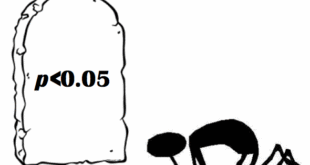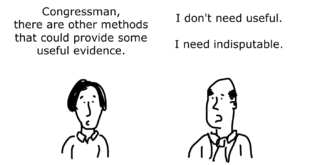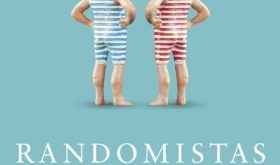How to avoid pernicious fictional statistics Mathematics is a limited component of solutions to real-world problems, as it expresses only what is expected to be true if all our assumptions are correct, including implicit assumptions that are omnipresent and often incorrect. Statistical methods are rife with implicit assumptions whose violation can be life-threatening when results from them are used to set policy. Among them are that there is human...
Read More »Econometrics — a mixture of ‘metaphors, metaphysics, and a pinch of bluff’
Econometrics — a mixture of ‘metaphors, metaphysics, and a pinch of bluff’ This effort to create foundations for the probability approach in econometrics finally results in an inconsistent set of claims in its defence. First, there are vast amounts of experience which warrant a frequency interpretation. This is supported by repetitive discussions of experimental design, but the inability to experiment inspires an epistemological interpretation. Then...
Read More »Resisting the ‘statistical significance testing’ temptation
Resisting the ‘statistical significance testing’ temptation Imagine a dictator “game” in which a mixed-sex group of experimental subjects are used as first players who can decide which share of their initial endowment they give to a second player (one person acts as second player for the whole group). Additionally, assume that the experimental subjects are a convenience sample but not a random sample of a well-defined broader population. What kind of...
Read More »The causal revolution in econometrics has gone too far
The causal revolution in econometrics has gone too far Kevin Lewis points us to this recent paper, “Can invasive species lead to sedentary behavior? The time use and obesity impacts of a forest-attacking pest,” published in Elsevier’s Journal of Environmental Economics and Management, which has the following abstract: “Invasive species can significantly disrupt environmental quality and flows of ecosystem services and we are still learning about their...
Read More »What are RCTs good for?
What are RCTs good for? RCTs establish causal claims. They are very good at this. Indeed, given the probabilistic theory of causality it follows formally that positive results in an ideal RCT with treatment C and outcome E deductively implies ‘C causes E in the experimental population’. Though the move from the RCT to a policy prediction that C will cause E when implemented in a new population often goes under the single label, the external validity of the...
Read More »A practice-based account of causal bias
A practice-based account of causal bias No estimated causal results are thus affected solely by the intervention but by many other background attributes and conditions that can give rise to bias between, within or across trial groups. A number of these influence a treatment’s estimated causal effects both within and outside a trial setting. That these and other such demanding preconditions (concauses) would be entirely satisfied for all participants is a...
Read More »The dangers of idealizing randomization
The dangers of idealizing randomization In his history of experimental social science — Randomistas: How radical researchers are changing our world — Andrew Leigh gives an introduction to the RCT (randomized controlled trial) method for conducting experiments in medicine, psychology, development economics, and policy evaluation. Although it mentions there are critiques that can be waged against it, the author does not let that shadow his overwhelmingly...
Read More »Handling missing data (student stuff)
Handling missing data (student stuff) .[embedded content]
Read More »Mendelian randomization
.[embedded content]
Read More »Causal inference
Causal effects are comparisons of what did happen with what would have happened if people had received different treatments. Randomized treatment assignment has reduced this problem to the minor technical problem of drawing an inference about a finite population of people on the basis of a probability sample from that population. Expressed differently, if we design an experiment so that the actual world is a random draw from a set of possible worlds, then we can draw...
Read More » Heterodox
Heterodox







